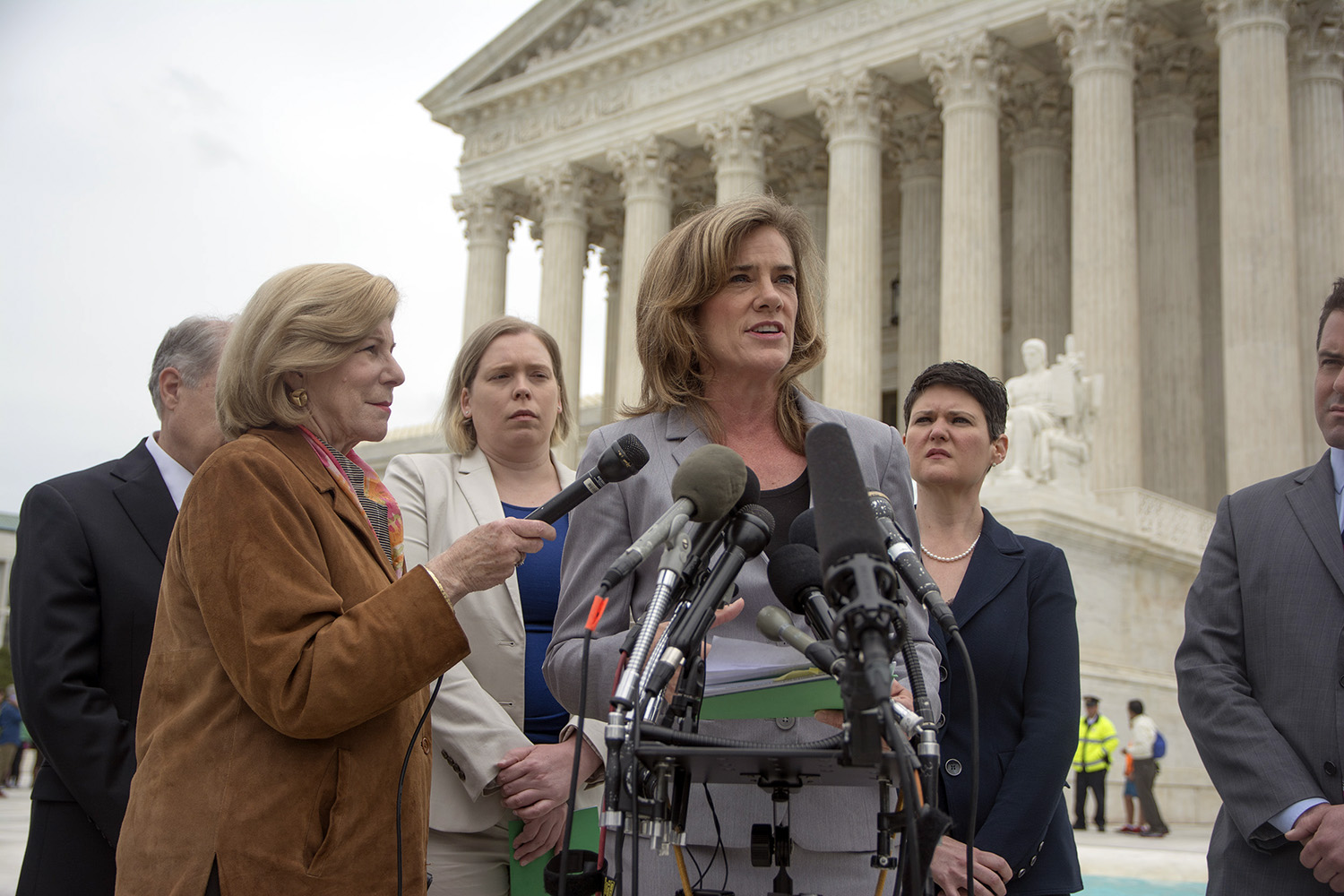A Baptist church/state specialist said after oral arguments April 20 the U.S. Supreme Court should rule against a Missouri church seeking state aid to make its playground safer, citing Baptist history when colonial dissenters objected to paying taxes to support a state church.
“The U.S. Supreme Court has never upheld direct government grants to churches, much less required a state to provide such funding,” Holly Hollman, general counsel of the Baptist Joint Committee for Religious Liberty, commented after justices heard arguments in Trinity Lutheran Church v. Comer, a case to decide whether officials in Missouri were entitled to reject an application from a Columbia church for a grant to use recycled tires to resurface a playground.

Holly Hollman, general counsel of the Baptist Joint Committee for Religious Liberty, commented after justices heard arguments in Trinity Lutheran Church v. Comer. (Photo/Cherilyn Crowe/BJC)
During oral arguments, the church’s attorney, David A. Cortman, said the state of Missouri excluded the Trinity Lutheran Learning Center program from a recycling program that provides a safer playground for children “solely because the preschool is operated by a church rather than a secular not-for-profit.”
Cortman, senior counsel and vice president of U.S. litigation with Alliance Defending Freedom, claimed a clause in the Missouri constitution barring use of money from the public treasury to aid “any church, sect or denomination of religion” is a product of “Blaine Amendments,” religious liberty protections stronger than those in the federal Constitution adopted by several states in the 19th century supposedly motivated by anti-Catholic bigotry.
Former Solicitor General of Missouri James Layton, arguing on behalf of the Missouri Attorney General’s Office, countered by calling the no-aid clause “an admirable tradition” adopted by the state in 1820 borrowing from Thomas Jefferson’s language in the 1786 Virginia Statute for Religious Freedom that “no man shall be compelled to frequent or support any religious worship.”
Hollman, who earlier co-authored a friend-of-the-court brief in the case arguing on behalf of the state, said the case “is about whether the state has to pay for the property improvements of a church, despite nearly 200 years of precedent and many practical considerations that argue otherwise.”
The most closely watched church/state case in the Supreme Court’s October 2016 term, conventional wisdom presumed the court would have been deadlocked 4-4 if it ruled on the case in the months immediately following last year’s death of Justice Antonin Scalia, putting all eyes on new Justice Neal Gorsuch in his first week on the job. Afterward, veteran court observers were surprised at how sympathetic toward the church even some of the more liberal justices seemed in their questioning of both lawyers.
“Some seemed at times incredulous at the arguments advanced by the state of Missouri,” Travis Wussow, general counsel and vice president for public policy of the Southern Baptist Ethics & Religious Liberty Commission, said in written comments quoted by Baptist Press.
The ERLC, public policy arm of the Southern Baptist Convention, also filed a friend-of-the-court brief, but it argued on behalf of Trinity Lutheran, saying churches should be allowed to participate in government programs on equal footing with other civic organizations.
“We are praying for a positive outcome in this case and specifically that the court would articulate a clear precedent that allows churches and people of faith equal access to resources in the public square,” Wussow said.
Hollman said questions asked by the justices illustrated “the difficulty of protecting against government funding of religion if the state gives money to a church.”
“Trinity Lutheran Church characterized the program as entirely secular, because it paid for property improvements specifically materials for the church playground,” Hollman said in a video posted later in the day on the BJC website. “But as we know, churches aren’t secular, so it’s not easily understood how this program does not do exactly what the Missouri constitution was designed to prevent: That is to give tax support to religion.”
Hollman said what seemed to get lost in the debate over what amounts to government funding of religion “is what most people involved in churches know.”
“Churches and other houses of worship are by definition expressions of religion, organized for religious exercise,” she said.” I don’t think of my church building as being divided into religious and secular zones, and we don’t want the government to make that decision.”
“We know that churches are, and should be, given special treatment, not equal treatment,” Hollman said. “It is a necessary protection for religious liberty, not a mark of hostility or discrimination against religion.”
A decision in the case is expected this summer.
